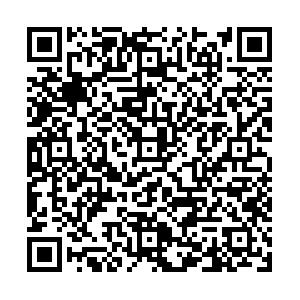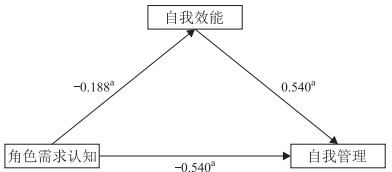The mediating effect of diabetes self-efficacy between perceived role demands and diabetes self-management among community patients with type 2 diabetes
-
摘要:
目的 调查2型糖尿病患者角色需求认知现状,并探讨自我效能在角色需求认知与自我管理之间的中介效应。 方法 采用横断面调查法,于2016年5—6月在北京蓟门里社区卫生服务中心,对210例2型糖尿病患者使用角色需求认知问卷、糖尿病自我管理量表、糖尿病自我效能量表进行调查。 结果 2型糖尿病患者角色需求认知得分中位数为0,得分范围为0~9分,66.19%的患者承担着家务劳动的职责,其次是工作和照顾小孩。不同性别在工作、家务劳动、照顾小孩及照顾其他人的角色需求方面差异具有统计学意义(均P<0.05);78.57%的患者自我效能得分处于中高水平; 65.24%的患者自我管理行为中等或偏下; 角色需求认知与自我效能、自我管理间均存在显著相关关系,其中角色需求认知与自我效能负相关,自我效能与自我管理正相关; 自我效能在角色需求认知和自我管理间存在中介效应,效应值为-0.101(P<0.001),其中,女性患者自我效能的中介效应显著而男性不显著,效应值为-0.130(P<0.05)。 结论 2型糖尿病患者不同性别间角色需求认知不同; 自我效能在2型糖尿病患者角色需求认知与自我管理之间存在中介效应,并且主要体现在女性患者而非男性患者。建议对角色需求认知水平较强的患者,尤其是女性患者,可以通过加强自我效能来提高自我管理行为。 Abstract:Objective To investigate the status of perceived role demands, explore the mediating effect of self-efficacy between perceived role demands and self-management among people with type 2 diabetes (T2DM) in China. Methods A cross-sectional study was conducted in this study. A total of 210 patients with type 2 diabetes from Jimenli Community Health Service Center in Beijing from May 2016 to June 2016 were surveyed by using perceived role demands scale, self-efficacy scale and siabetes self-management scale for patients with T2DM. Results The score of perceived role demands scale ranged from 0 to 9, with median as 0; 66.19% percent of the patients were responsible for household chores, followed by work and child care. There were statistically differences in the perceived role demands of work, household chores and child care between different genders (all P < 0.05). Seventy-eight point five seven percent of patients' self-efficacy scores were in a relatively middle and high level; 65.24% patients' self-efficacy scores were in a middle to low level.Among them, perceived role demands were negatively associated with self-efficacy, and self-efficacy was positively associated with self-management. Perceived role demands were significantly correlated with self-efficacy and self-management (P < 0.05). Self-efficacy had a mediating effect between perceived role demands and self-management, the coefficient was -0.101 (P < 0.001). In addition, self-efficacy mediated the effect of perceived role demands on self-management for females but not males. Conclusion There is gender difference in perceived role demands of patients with T2DM. Self-efficacy significantly mediates the relationship between perceived role demands and self-management, especially for females. This finding suggests that for those who are with strong perceived role demands, especially for females with diabetes, Clinicians should consider improving self-efficacy to enhance diabetes self-management behaviors in future interventions. -
Key words:
- Type 2 diabetes /
- Perceived role demands /
- Self-management /
- Self-efficacy /
- Mediating effect
-
表 1 210例2型糖尿病患者一般资料
项目 例数(%) 项目 例数(%) 年龄(岁) 患病时间(年) ≤45 7(3.33) ≤5 66(31.43) 45~60 53(25.24) 5~10 35(16.67) ≥60 150(71.43) ≥10 109(51.90) 婚姻状况 是否合并慢性病 未婚 1(0.48) 是 178(84.76) 已婚 188(89.52) 否 32(15.24) 丧偶 21(10.00) 有无并发症 家庭月收入(元) 有 125(59.52) <4 000 106(50.48) 无 85(40.48) 4 000~8 000 90(42.85) 教育程度 >8 000 14(6.67) 小学及以下 27(12.86) 就业状态 初中 62(29.52) 失业 5 (2.38) 中专及高中 59(28.10) 兼职 3 (1.43) 大专 26(12.38) 全职 28(13.33) 本科及以上 36(17.14) 退休 174(82.86) 表 1 2型糖尿病患者所承担的角色及角色需求认知得分情况
所承担角色 例数(%) 角色需求认知得分[M(P25,P75),分] 男性角色需求认知得[M(P25,P75),分] 女性角色需求认知得分[M(P25,P75),分] 男性秩均值 女性秩均值 Z值 P值 工作 40(19.05) 0(0, 0) 0(0, 1) 0(0, 0) 117.70 94.62 -4.339 < 0.001 家务劳动 139(66.19) 0(0, 0) 0(0, 0) 0(0, 1) 96.54 113.50 -2.950 0.003 照顾小孩 39(18.57) 0(0, 0) 0(0, 0) 0(0, 0) 96.06 113.92 -3.784 < 0.001 照顾其他人 32(15.24) 0(0, 0) 0(0, 0) 0(0, 0) 100.27 110.17 -2.369 0.018 社区服务 13(6.19) 0(0, 0) 0(0, 0) 0(0, 0) 105.00 105.95 -0.944 0.345 课业 8(3.80) 0(0, 0) 0(0, 0) 0(0, 0) 105.68 105.34 -0.138 0.890 表 3 2型糖尿病患者自我效能水平
维度 最小值 最大值 得分(x±s,分) 排序 药物治疗 0.00 10.00 9.52±1.24 1 血糖监测和足部检查 2.00 10.00 7.99±1.94 2 身体锻炼和体重 1.25 10.00 7.48±1.98 3 营养 0.11 10.00 6.85±2.30 4 表 4 2型糖尿病患者自我管理行为得分
维度 最小值 最大值 得分(x±s,分) 排序 用药管理 1 5 4.56±0.92 1 并发症及危险因素管理 1 5 3.95±0.81 2 饮食管理 1 5 3.60±0.77 3 血糖监测 1 5 3.46±1.14 4 运动管理 1 5 3.23±1.14 5 表 5 自我效能在角色需求认知和自我管理间的中介效应结果
效应 路径 β(总样本) β(男) β(女) 总效应 角色需求认知→自我管理 -0.313a -0.389a -0.290a 间接效应 角色需求认知→自我效能→自我管理 -0.101a -0.064 -0.130b 直接效应 角色需求认知→自我管理 -0.212a -0.325a -0.160b 注:aP < 0.001,bP < 0.01。β为具体效应值。 -
[1] 国际糖尿病联盟. 全球糖尿病概览第九版[EB/OL]. https://www.diabetesatlas.org/en/resources/2019-11-14/2020-03-09. [2] 中华医学会糖尿病学分会. 中国2型糖尿病防治指南(2017年版)[J]. 中华糖尿病杂志, 2018, 10(1): 4-67. doi: 10.3760/cma.j.issn.1674-5809.2018.01.003 [3] 嵇加佳, 刘林, 楼青青, 等. 2型糖尿病患者自我管理行为及血糖控制现状的研究[J]. 中华护理杂志, 2014, 49(5): 617-620. doi: 10.3761/j.issn.0254-1769.2014.05.026 [4] 麻倩, 井坤娟, 郭玉芳. 糖尿病患者自我管理现状及影响因素研究[J]. 现代预防医学, 2019, 46(5): 915-920. https://www.cnki.com.cn/Article/CJFDTOTAL-XDYF201905035.htm [5] 李菁, 李峥, NOLAN M, 等. 影响糖尿病患者自我管理的心理社会因素的研究进展[J]. 中华护理杂志, 2014, 49(2): 207-211. doi: 10.3761/j.issn.0254-1769.2014.02.021 [6] LI Y. Delay In seeking medical evaluation for suspicious breast symptom(s) among Taiwanese women in Taiwan[D]. Chicago: University of Illinois, 2012. [7] 郑东鹏, 卢爱敏. 家庭医生社区综合心理干预对2型糖尿病患者生存质量影响的研究[J]. 中华全科医学, 2020, 18(4): 615-618. https://www.cnki.com.cn/Article/CJFDTOTAL-SYQY202004025.htm [8] SHEN H, EDWARDS H, COURTNEY M, et al. Barriers and facilitators to diabetes self-management: Perspectives of older community dwellers and health professionals in China[J]. Int J Nurs Pract, 2013, 19(6): 627-635. doi: 10.1111/ijn.12114 [9] CHLEBOWY D O, HOOD S, LAJOIE A S. Gender differences in diabetes self-management among African American Adults[J]. West J Nurs Res, 2013, 35(6): 703-721. doi: 10.1177/0193945912473370 [10] BANDURA A. Self-efficacy: toward a unifying theory of behavioral change[J]. Behav Res Ther, 1977, 84(4): 139-161. http://repository.unika.ac.id/5450/8/03.40.0215%20Diza%20Oktananda%20DAFTAR%20PUSTAKA.pdf [11] 范润平, 龚青霞, 王婧, 等. 自我效能在2型糖尿病患者社会支持与自我管理关系中的中介作用[J]. 护理实践与研究, 2017, 14(24): 119-121. doi: 10.3969/j.issn.1672-9676.2017.24.052 [12] 刘林, 徐慧文, 王世伟, 等. 自我效能在空巢老年2型糖尿病病人心理痛苦与自我管理间的中介效应研究[J]. 中国护理管理, 2019, 19(11): 1621-1625. doi: 10.3969/j.issn.1672-1756.2019.11.006 [13] JIANG X J, JIANG H, LI M Z, et al. The mediating role of self-efficacy in shaping self-management behaviors among adults with type 2 diabetes[J]. Worldviews Evid Based Nurs, 2019, 16(2): 151-160. doi: 10.1111/wvn.12354 [14] 吴诗诗, 刘宇, 林可可, 等. 自我效能在2型糖尿病患者家族主义和自我管理间的中介效应[J]. 中国实用护理杂志, 2020, 36(35): 2764-2768. doi: 10.3760/cma.j.cn211501-20200319-01262 [15] 葛均波, 徐永健. 内科学[M]. 9版. 北京: 人民卫生出版社, 2018: 725-744. [16] BIJL J V, POELGEEST-EELTINK A V, SHORTRIDEGE-BAGGETT L. The psychometric properties of the Diabetes Management Self-Efficacy Scale for patients with type 2 diabetes[J]. J Adv Nurs, 1999, 30(2): 352-359. doi: 10.1046/j.1365-2648.1999.01077.x [17] VIVIENNE WU S F, COURTNEY M, EDWARDS H, et al. Development and validation of the Chinese version of the diabetes management self-efficacy scale[J]. Int J Nurs Stud, 2008, 45(4): 534-542. doi: 10.1016/j.ijnurstu.2006.08.020 [18] 张婧珺, 刘宁, 鱼星锋, 等. 糖尿病自我管理量表的研制及信效度检验[J]. 护理研究, 2014, 28(28): 3578-3580. https://www.cnki.com.cn/Article/CJFDTOTAL-SXHZ201428058.htm [19] HUANG M, ZHAO R, LI S, et al. Self-management behavior in patients with type 2 diabetes: a cross-sectional survey in western urban China[J]. PLoS One, 2014, 9: e95138. doi: 10.1371/journal.pone.0095138 [20] 温忠麟, 叶宝娟. 中介效应分析: 方法和模型发展[J]. 心理科学进展, 2014, 22(5): 731-745. https://www.cnki.com.cn/Article/CJFDTOTAL-XLXD201405001.htm [21] 廖武钢. 文化变迁中老年人家庭生活的转变与调适[D]. 武汉: 华中师范大学, 2014. [22] 第三期中国妇女社会地位调查课题组. 第三期中国妇女社会地位调查主要数据报告[J]. 妇女研究论丛, 2011(6): 5-15. https://www.cnki.com.cn/Article/CJFDTOTAL-FNYJ201106001.htm [23] 孙鹃娟, 冀云. 中国老年人照顾孙子女对老化态度的影响[J]. 人口与发展, 2016, 22(4): 79-86. doi: 10.3969/j.issn.1674-1668.2016.04.010 [24] 徐绮, 薛锦花, 刘连勇, 等. 某社区中年人群糖尿病患者综合管理现况与分析[J]. 中华全科医学, 2017, 15(8): 1374-1377. https://www.cnki.com.cn/Article/CJFDTOTAL-SYQY201708032.htm [25] 张小丽, 张盼, 邢凤梅, 等. 农村中老年糖尿病患者自我效能现状及影响因素[J]. 中国老年学杂志, 2017, 37(2): 474-475. doi: 10.3969/j.issn.1005-9202.2017.02.098 [26] 高珊珊. 老年2型糖尿病病人自我管理行为及影响因素分析[J]. 全科护理, 2018, 16(7): 816-818. https://www.cnki.com.cn/Article/CJFDTOTAL-JTHS201807023.htm [27] 孙月明, 陈璐璐. 糖尿病患者开展自我管理教育对提升自身护理能力的效果研究[J]. 中华全科医学, 2016, 14(11): 1952-1954. https://www.cnki.com.cn/Article/CJFDTOTAL-SYQY201611052.htm [28] 冯丽娜. 河北省老年人健康自我管理现状及影响因素分析[D]. 唐山: 华北理工大学, 2015. -





 下载:
下载:



